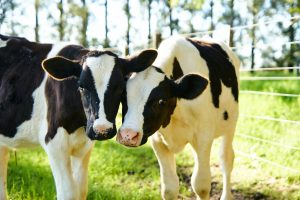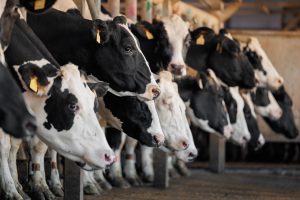Álvaro García
Ruminant nutritionists traditionally focus on fulfilling nutrient requirements to support growth, lactation, and reproduction. Contemporary nutritional science, however, reveals a deeper role for nutrients beyond simply serving as substrates, they directly influence gene expression. This nutrient-driven modulation, termed epigenetics, significantly affects immunity, health, and longevity in dairy cows.
Epigenetics (Greek: epi-, meaning “above,” and genetics, meaning “origin”) refers to mechanisms regulating gene activity without changing the underlying DNA sequence. Simply put, epigenetics acts like switches, turning genes on or off based on nutrient-derived metabolites. When these metabolites are abundant, beneficial genetic pathways activate; when scarce or imbalanced, critical pathways may become inactive, compromising health and longevity.
Epigenetic mechanisms explained
Primary epigenetic mechanisms include DNA methylation, histone modifications, and non-coding RNA regulation. Adding methyl groups to DNA sites (CpG islands), typically silences gene expression. Histones, small proteins forming nucleosomes around which DNA wraps, can undergo acetylation, methylation, and phosphorylation. These modifications alter DNA packaging: tightly wrapped DNA suppresses genes, while loosely wrapped DNA allows gene expression. Non-coding RNAs further influence gene interpretation. These epigenetic modifications are heritable and responsive to dietary conditions.
Nutritional impacts on epigenetics
Specific nutrients, including methionine, choline, folic acid, vitamin B12, and minerals like zinc and selenium—are essential for epigenetic processes. DNA methylation heavily depends on methyl groups provided primarily by dietary methionine, choline, and folate. The enzyme DNA methyltransferase (DNMT) transfers these methyl groups onto cytosines at CpG sites, critically regulating gene expression.
Dairy nutritionists typically supplement methionine and choline following NASEM (2021) recommendations, often unaware of their epigenetic effects. Meeting these nutrient guidelines enhances DNA methylation, suppresses pro-inflammatory cytokines, strengthens immune responses, and reduces susceptibility to diseases such as mastitis and metritis. Conversely, nutrient deficiencies disrupt methylation patterns, increasing inflammation and disease risk.
Histone modifications mediated by histone acetyltransferases (HATs) and histone deacetylases (HDACs) similarly rely on nutrients. Histone acetylation enhances gene expression, dependent on acetyl-CoA, linking energy metabolism directly to gene regulation.
Epigenetics effects on immunity, health, and longevity
Emerging research highlights epigenetics’ significant impact on immunity and health. Proper nutrient intake activates protective immune pathways, enhancing pathogen resistance and reducing chronic inflammation. Selenium, for instance, modulates epigenetic pathways governing selenoprotein expression, essential for a stronger immunity and antioxidant protection.
Short-chain fatty acids (SCFAs) like butyrate, acetate, and propionate—produced via ruminal fiber fermentation—also influence epigenetics. Butyrate strongly inhibits HDACs, promoting anti-inflammatory expression, while acetate and propionate indirectly enhance histone acetylation by supplying acetyl groups. These SCFAs significantly impact gut health, systemic immunity, and overall animal health (Kasubuchi et al., 2015).
Epigenetic activation begins within the first few days of life. Calves receiving insufficient colostrum or nutritional restriction during critical developmental periods typically underperform later in life. Colostrum provides essential nutrients and bioactive factors for positive epigenetic programming. Inadequate colostrum intake or early-life nutritional deficiencies can alter DNA methylation, histone modifications, and gene expression, impairing metabolism and immunity, increasing susceptibility to disease, and adversely affecting adult productivity.
Practical nutritional strategies to promote epigenetic up-regulation
To positively influence epigenetic outcomes, implement these specific nutrient recommendations:
- Methionine and choline:
- Rumen-protected methionine: 10–15 g/day (2.3–2.4% of metabolizable protein).
- Rumen-protected choline: 12–20 g/day, from 21 days pre- to 21 days post-calving.
- Folate and vitamin B12:
- Vitamin B12 (rumen-protected): 0.5–1.0 mg/day during metabolic stress.
- Folate (rumen-protected): 2–3 mg/kg DM intake/day during transition and early lactation.
- Trace minerals:
- Selenium: 0.3 mg/kg DM, preferably as selenomethionine.
- Zinc: 40–60 mg/kg DM (combination of organic and inorganic forms).
- Copper: 12–16 mg/kg DM.
- Fiber for optimal VFA production:
- Dietary NDF: 28–32% of diet DM; forage NDF: 20–24% of diet DM.
- Physically effective fiber (peNDF): >21%.
- Energy balance:
- Energy density: 1.55–1.65 Mcal/kg NEL (close-up dry period), increasing to 1.70–1.75 Mcal/kg NEL post-calving.
- Support dry matter intake (3.5–4% of body weight/day at peak lactation).
- Colostrum management:
- Feed 4 liters of high-quality colostrum (>50 g IgG/L) within 2 hours of birth.
- Ensure calves consume at least 150–200 g of IgG within the first 24 hours.
Economic and practical implications
Epigenetic nutrition significantly impacts cow longevity beyond short-term productivity metrics like milk yield. Improved epigenetic programming reduces disease incidence, prolongs productive lifespan, lowers replacement costs, and enhances lifetime profitability. Cows managed with optimal epigenetic nutrition demonstrate increased lifetime milk production, reduced veterinary interventions, and greater farm economic sustainability.
Optimizing nutritional strategies for epigenetic up-regulation involves more than basic nutrient provision; it strategically modulates gene expression pathways essential for immunity, health, and longevity. Recognizing and leveraging nutritional epigenetics presents dairy nutritionists with powerful tools to enhance animal welfare, productivity, and economic outcomes, supporting sustainable dairy farming practices.
© 2025 Dellait Knowledge Center. All Rights Reserved.









